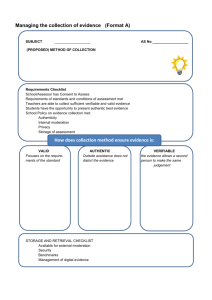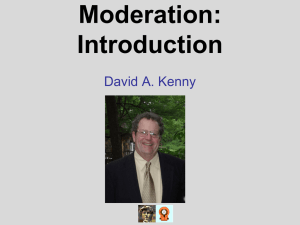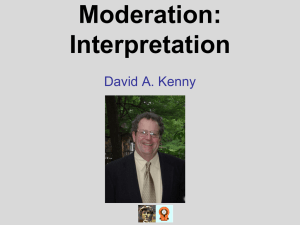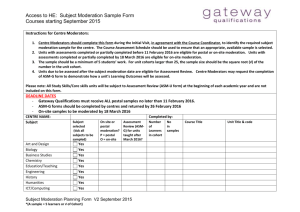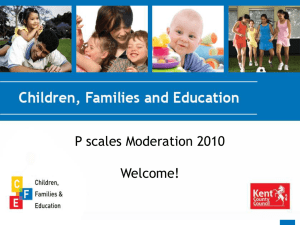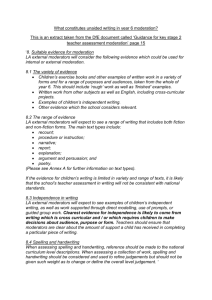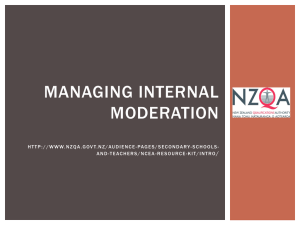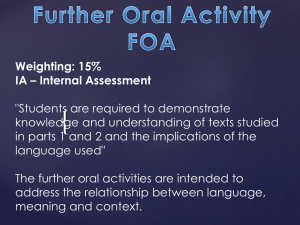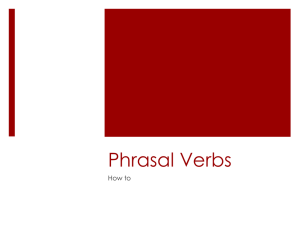DOC - Commonwealth Association for Education Administrator
advertisement
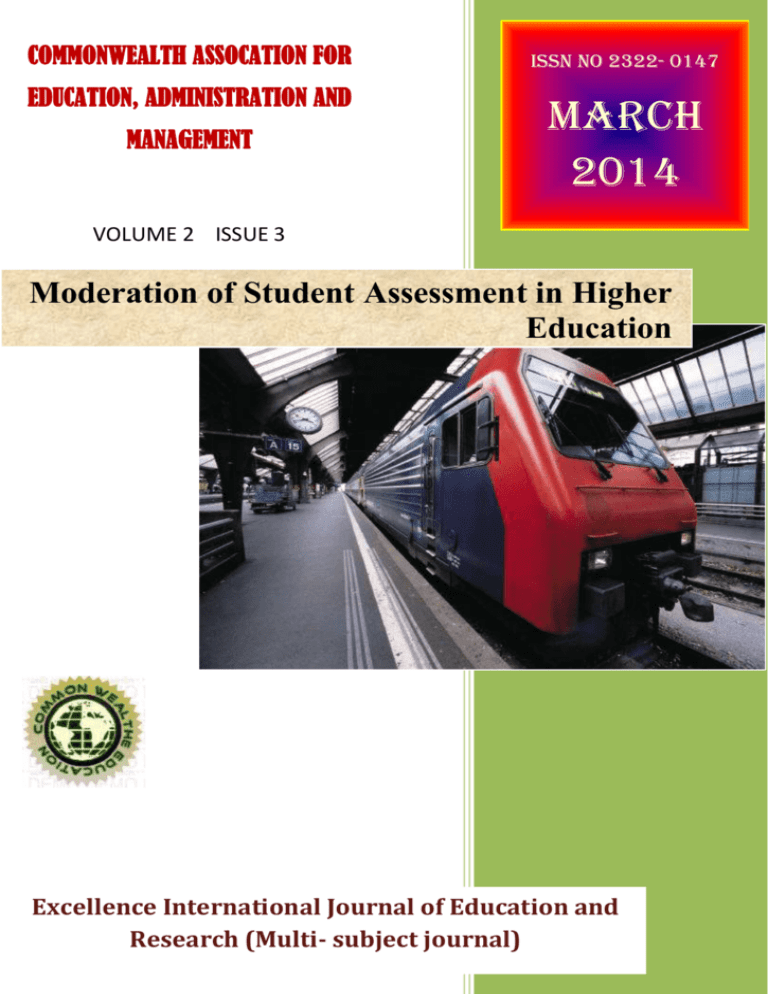
COMMONWEALTH ASSOCATION FOR EDUCATION, ADMINISTRATION AND MANAGEMENT ISSN NO 2322- 0147 MARCH 2014 VOLUME 2 ISSUE 3 Moderation of Student Assessment in Higher Education Excellence International Journal of Education and Research (Multi- subject journal) Excellence International Journal Of Education And Research VOLUME 2 ISSUE 3 ISSN 2322-0147 Moderation of Student Assessment in Higher Education Dr. Mahamud Khan, Ex- Researcher D/O Education, AMU, Aligarh202002-(U.P) DR. (Mrs.) Salma Kuraishy Associate Professor Department of Education Aligarh Muslim University Aligarh -202002- (U.P) India Educational Consultant, Member Affiliate with Institute for Learning, U.K., Japanese Government Scholarship (Mombusho) Awardee Gold Medalist ABSTRACT Moderation of student assessment is a critical component of teaching and learning in contemporary universities. Yet, despite this, it tends to be marked by idiosyncratic and sporadic processes informed by minimal understanding. This paper, in the light of forthcoming radical national requirements for the declaration of moderation processes in tertiary curricula in India, will present four discourses of moderation. In a Faculty of Education in a large metropolitan university in Australia we identified four discourses of equity, justification of assessment and accountability. The thrust of this paper is that they will act as a starting point for academics to review their beliefs and attitudes towards moderation of student assessment. Keywords: Moderation; assessment of higher education; professional conversations Introduction Moderation is understood to be a practice of engagement in which teaching team members develop a shared understanding of assessment requirements, standards and the evidence that demonstrates differing qualities of performance (Adie, Lloyd and Beutel 2011. Its purpose is to ensure that the assessment with established criteria, learning outcomes and standards; assessment processes are equitable, fair and valid; judgements are consistent, reliable and based on evidence within the task response. The process of moderation in higher education is usually governed by universitywide policies and practices. In the United Kingdom and in New Zealand, for example, this takes the form of an established practice of external and internal moderation that is part of the quality management process (New Zealand Qualifications Authority 2011; Quality Assurance Agency for Higher Education 2011). In Australia, the process has been typically located within individual institutions with occasional reference, in specific circumstances, to external expertise. While internal moderation supports consistency of judgements and standards within an institution, external moderation involves judgements by an expert with the purpose of ensuring consistency with national standards across higher degree institutions. Moderation processes in universities in Australia are guided by the national university accreditation authority, the Tertiary Education Quality (TEQSA) and Standards Agency which began Excellence International Journal Of Education And Research (Multi-subject journal) Page 434 Excellence International Journal Of Education And Research VOLUME 2 ISSUE 3 ISSN 2322-0147 operations in late January 2012 (TEQSA 2012). University programmes will be required to declare. This formalising of systemic moderation of assessment in Australian universities is likely to upset a culture of practice, in which moderation is part of the teaching and learning process but is not currently overt. There appears, at present, to understanding of moderation as an integral part of teaching and learning, and differentiated understanding as to why or how moderation should occur and how circumstances may affect the type of practice adopted. This may lead to the emergence of idiosyncratic or sporadic processes between and within tertiary institutions (see, for example, Goos, Gannaway, and Hughes 2011). These, over time, become habituated in standard practice for individuals or small teams which are neither shared nor questioned (see Bloxham 2009; Bloxham, Boyd, and Orr 2011; Hughes 2008; Lawson and Yorke 2009). What have emerged are pockets of well-intentioned or rigorously defended practice which may privilege one type of moderation over another. For example, this may be manifested in the singular and narrow view of moderation as an exclusively post hoc process concerned solely with per formative measures and outcomes (see Orr 2007). It is expected that the TEQSA requirement for Australian universities will force consideration of moderation practices as part of curriculum design and allow greater transparency to students and system authorities. It will further force a constructive alignment (Biggs 1999; Biggs and Tang 2011) between learning outcomes, assessment and moderation. To understand how moderation is being used by academics in Australia, we have drawn on the work of Michel de Certeau (1984) and his notions of accommodation and appropriation of practices. De Certeau focussed on the adoption and transformation of objects and spaces to suit the needs of users and to align with their personal understandings and beliefs. Thus, at the surface level, practices as required through policy are being followed and may be seen to align with the incoming TEQSA requirements. However, on closer inspection, multiple and varied enactments are revealed which may only partly satisfy the new requirements. De Certeau (1984) proposed that investigations need to examine the different ways of operating within a given practice by its users because: The presence and circulation of a representation tells us nothing about what it is for its users. We must first analyse its manipulation by users who are not its makers. Only then we can gauge the difference or similarity between the production of the image and the secondary production hidden in the process of its utilisation. (xiii) de Certeau’s theories suggest to us that while we can confidently state that moderation processes are occurring within higher education institutions (for policies and public statements clearly indicate that this is the case), we need to delve deeper into the enactments of moderation processes to understand the mechanisms of its ‘consumption’ by academics. Only then we can start to untangle and interpret the contribution of moderation to the teaching and learning practices within higher education. This paper will describe four discourses that emerged from a recent review of moderation practices in a Faculty of Education in an Australian University (Adie,Lloyd and Beutel 2011). It will premise its discussion on an understanding that moderation is not a simple linear process cumulatively built from isolated practices. It is, rather, complex and frequently inaccessible. By presenting moderation as multiple discourses, we will attempt to provide a framework for academics to navigate through the process and to make decisions about practice which will suit their systemic contexts. Moderation as equity Moderation as equity was typified by conversations of consistency and fairness for students which aligned with broader discourses of equity within the university. Notions of equity comparable to this understanding are prevalent in the general rationales provided by tertiary institutions. For example, the University of Tasmania (2011) prefaces its guide to Excellence International Journal Of Education And Research (Multi-subject journal) Page 435 Excellence International Journal Of Education And Research VOLUME 2 ISSUE 3 ISSN 2322-0147 academics by stating that ‘the purpose of moderation is to ensure that teachers are making consistent judgements about standards ... [and that] a response is awarded a particular level of achievement regardless of who marks/grades it’. Similarly, Curtin University (2010) equates quality assurance to accuracy, consistency and fairness. This is further supported in the literature by Hughes (2008) who suggested that one of the purposes of moderation was ‘improvement through consistent and comparable judgements’ (1), while Bloxham (2009) included fairness in a list of benefits of ‘good moderation’. The equity discourse in our study was evident when academics spoke of moderation in terms of enabling them to have confidence in the consistency of their interpretation of the standards amongst other markers, which ensured fairness for all students. It was important that similar standards were seen to be applied across cohorts of students. For example, a coordinator of a large unit stated, in an interview said that ‘moderation is for ensuring fairness in marking across a cohort the fairness element is for me the biggest point of moderation’. Moderation as justification Moderation as justification was typified by conversations of confidence in decisions, providing quality feedback, and support to respond to student queries. Achievement standards within higher education are acknowledged to encompass multiple dimensions of knowledge, skills and higher order thinking processes (Bloxham 2009; Sadler 2010). This complexity makes standards difficult to define (Coates 2010) and creates one of the major tensions facing academics in the higher education sector: how to assess and make judgements with consistency and comparability according to standards which remain complex and elusive turning the purpose of moderation towards themselves. Moderation provided academics with confidence in the decisions that they had made, so that they could justify their decisions to students if queried as well as providing better feedback on the qualities within a student’s work that denoted a standard. For example, one academic commented that moderation is about professional justification, to be able to justify the grade given, so if a student comes back with a query about it, a professional justification can be given for that grade and the assignment does not go forward unless a teacher has professionally justified to oneself what grade was given. The teacher should then feel comfortable and be in a position to say to the student ‘well, you do the same process and we will compare what we have come up with’. There are two related aspects within this discourse. The first is concerned with preparing a public defence in the instance of a dissatisfied student questioning their grade. The second is internal to the academic who wants to be Assessment and Evaluation in Higher Education comfortable with or convinced by the validity of their decision-making. Moderation of achievement standards amongst academics is purported to support the development of consistency in the understanding, interpretation and enactment of standards. Bloxham (2009) similarly noted the benefits of moderation has increased student confidence in marking and the development of staff confidence in responding to students’ assessment queries. Moderation as community building Excellence International Journal Of Education And Research (Multi-subject journal) Page 436 Excellence International Journal Of Education And Research VOLUME 2 ISSUE 3 ISSN 2322-0147 Moderation as community building Moderation as community building is typified by conversations of collaborative establishment and review of assessment tasks, criteria, standards, learning experiences and teaching strategies. Developing shared knowledge of standards is understood as being ‘created through a social process involving dialogue and experience and using artefacts’ (Bloxham 2009, 218). Where moderation was thought of as a community building experience, academics worked purposefully to involve the entire teaching team in discussions that commenced at the beginning of the semester. For example, one academic explained how she had members of her team mark and moderate a common assessment item before the commencement of the teaching semester. The ensuing discussion involved academics in developing a shared understanding of the standard of work required for the current year level cohort and the qualities that would denote a standard. This conversation also involved academics considering how they would support student learning of the qualities being valued in this unit as evidenced in the assessment task. But there were a number of difficulties faced by the unit coordinators who wanted to use moderation to develop shared understandings of practice within the teaching team and to engage staff in quality discussions. These included issues with • The assessment task, particularly in relation to the length and complexity; • The time frame, particularly in the instance of examinations where there was limited opportunity for extended discussion; and • The size and configuration of the teaching team, particularly in the instances of larger and geographically dispersed teaching teams, and the varying involvement of permanent and sessional staff. Where these difficulties are overcome, shared discourses of moderation and standards can be established. We observed the mentoring of new academics and those new to the unit and regarded these as clear evidence of community building. Moderation as accountability Moderation as accountability is typified by references to distribution of marks; and the unit coordinator as standard setter, final arbiter and expert. As many authors (Bloxham 2009; Hughes 2008; Sadler 2010) have stated, moderation is the institutional mechanism by which we can assure the quality of our assessment processes within higher education. From the perspective of unit coordinators and academics in our study, moderation was a process made necessary by their responsibility for the marks that they awarded students for assessments. This sense of responsibility became problematic when the emphasis on the grading process moved to a normative representation of performance. This occurred typically when unit coordinators used standard deviation and distribution of marks within and across tutorials to call for adjustments of student grades. While the distribution of marks can provide insight into the standard being applied to marking by a tutor, it is important that this information is understood as only part of the story and that other factors must be considered before grades are adjusted. Akin to the study conducted by Goos, Gannaway and Hughes 2011, current university policy on assessment at times appeared to be either misunderstood, or unknown, with staff appearing to be working under superseded policy guidelines and Excellence International Journal Of Education And Research (Multi-subject journal) Page 437 Excellence International Journal Of Education And Research VOLUME 2 ISSUE 3 ISSN 2322-0147 practices. When definitions of moderation and description of practice appeared overly concerned with the normative distribution of marks and grades per formative outcomes of students, lecturers were concerned with systemic processes to justify results, particularly if ‘too many’ grades of distinction or high distinction had been awarded. While an argument could be raised that such a heavy weighting of grades may infer an issue with the rigour of the assessment task, or the standard as interpreted by the marker, it does not indicate that student grades should be adjusted when marking against a standard that has been provided to students. Conclusion This paper has presented four discourses of moderation which emerged from a recent study in a Faculty of Education in Indian. From this, noted that moderation practice is currently an idiosyncratic mix of beliefs and experience espoused through one or more of the discourses, namely equity, justification, community building and accountability. Further, and more critically, we observed moderation occurring as different enactments of practice as lecturers appropriated a policy discourse to accommodate differing needs and differing understandings. While we believe that moderation involving substantive conversations around the quality of work is integral to effective teaching and learning, we warn against viewing moderation in a simplistic or singular way. In this paper, we have attempted to untangle the different ways that moderation is viewed and enacted in one university faculty. With this start, we hope to open up avenues for further critique of the value of moderation processes in higher education when working within standards-based assessment practices. We also hope to have provided academics with a starting point from which to review their current practice before engaging with newly imposed national requirements. References 1. Adie, L., M. Lloyd, and D. Beutel. 2011. “QUT Faculty of Education: Moderation practices in the Faculty of Education.” Unpublished Report, Teaching and Learning Development Grant, Queensland University of Technology. 2. Biggs, J. 1999. Teaching for Quality Learning at University. Buckingham: Open University Press. 3. Biggs, J., and C. Tang. 2011. Teaching for Quality Learning at University. 4th ed. 4. Bloxham, S. 2009. “Marking and Moderation in the UK: False Assumptions and Wasted Resources.” Assessment & Evaluation in Higher Education 34 (2): 209–220. 5. Bloxham, S., P. Boyd, and S. Orr. 2011. “Mark My Words: The Role of Assessment Criteria in UK Higher Education Grading Practices.” Studies in Higher Education 36 (6): 655–670. 6. Coates, H. 2010. “Defining and Monitoring Academic Standards in Australian Higher Excellence International Journal Of Education And Research (Multi-subject journal) Page 438 Excellence International Journal Of Education And Research VOLUME 2 ISSUE 3 ISSN 2322-0147 7. Cohen, L., L. Manion, and K. Morrison. 2011. Research Methods in Education. 7th ed. New York, NY: Routledge. 8. Curtin University. 2010. “Developing Appropriate Assessment Tasks.” In Teaching and Learning at Curtin 2010, 22–44. Accessed July 16, 2012. http://otl.curtin.edu.au/teaching_ learning/handbook.cfm. de Certeau, M. 1984. The Practice of Everyday Life. Berkeley, CA: University of California Press. 9. Gee, J. P. 1996. Social Linguistics and Literacies: Ideology in Discourses. 2nd ed. London: Routledge Falmer. 10. Goos, M., and C. Hughes. 2010. “An Investigation of the Confidence Levels of Course/Subject Coordinators in Undertaking Aspects of Their Assessment Responsibilities.” Assessment and Evaluation in Higher Education 35 (3): 315–324. 11. Schooling.” In Foucault and Education: Disciplines and Knowledge, edited by S. J. Ball, 167–206. London: Routledge. 12. Kuzich, S., R. Groves, S. O’Hare, and L. Pelliccione. 2010. “Building Team Capacity: Excellence International Journal Of Education And Research (Multi-subject journal) Page 439
